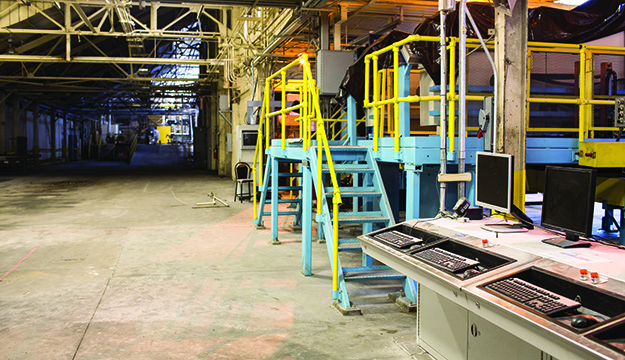
Then-CEO Chris Cording and President Eric Kerney in 2014. Cording is no longer affiliated with the company.
By Jeff Keeling
Production shutdowns; unpaid employees; a capital shortage – it wasn’t supposed to be this way when a group of glass industry veterans opened Heritage Glass in Kingsport’s former AGC North America Blue Ridge glass plant. But as the Business Journal prepared to go to print June 5, production at the plant was shut down temporarily as President Eric Kerney and other company directors sought financing help, less than a year after Heritage started producing solar glass in an effort Kerney said at the time was, “all about jobs.” The earliest the plant could begin meeting demand, one company director said June 4, would be in about three months due to some needed equipment that applies a recently developed anti-reflective coating to the solar panels.
Echoing statements Heritage has made in several official releases since early May, when reports began surfacing about troubles at the plant, Heritage Director Vic Davis said the company was undercapitalized. In an interview with the Business Journal, Davis went much further in explaining details of Heritage’s difficulties – and its hopes for a viable recovery – than any of the company’s official releases had. Heritage, he said, still has promise to become a profitable manufacturer, as it is the only domestic supplier of rolled pattern solar glass, with the U.S. market currently supplied by Chinese companies.
“The only other option is the Chinese, and quite frankly they’ve got to put glass on a boat for 10,000 miles,” Davis said.
“We’ve got a lot of advantages. We can ship to two-thirds of the U.S. market within two days. Our glass will produce .5 percent more transmittance for power than anybody’s glass in the world, and we can do that consistently. It has to do with the raw materials that we use, it has to do with our proprietary patterns in the manufacture of our glass. That’s a proven method that we have learned in the last three months.”
None of that will matter much, though, if Heritage doesn’t find investors willing to take a calculated risk and pump significant financing into the operation. Davis said two main factors contributed to the current cash crunch.
“We did not recognize how long it would take to get back into a very competitive solar market,” said Davis, whose construction company did much of the hauling of raw materials for Heritage. “Secondly, we’ve learned in recent months the necessity of new technology and a new ARC coating (anti reflective) that the solar world is demanding.”
Davis said company leaders are pulling out all the stops seeking enough to get Heritage recapitalized and to pay for the new equipment that applies the coating. He said that equipment is in Italy and would take three months to get to Kingsport, install, and put into production – if the company is able to procure the necessary funds.
“I think we can prove without a doubt that we’re a great investment,” Davis said. “We’ve got projections. The only thing we lack is the new technology for the coating and then we are a viable alternative to the Chinese. Until we do that we’re not. That’s really what came to light. We’ve got a good coating, but there is a great coating out there now. We can provide any potential investor with a very good story on rate of return. It will be a moneymaker if we can find somebody that has confidence in us.”
Sullivan County’s primary economic development official and an industry expert both said they’re pulling for the company, which is comprised of some veterans who cut their teeth in other Kingsport-area glass operations including the Blue Ridge facility, but neither sounded overly optimistic.
“Sometimes economic development groups and governments can only do so much,” Networks CEO Clay Walker said. The Kingsport Economic Development Board purchased the plant with $2.6 million of public money (Heritage bought the equipment and remaining contents) and entered a 15-year lease-purchase agreement with Heritage. The overall investment announced in late April 2014 was nearly $16 million. “We can’t make businesses successful, we can just try to give them every chance within our power, and that’s what we’ve been doing,” Walker said.
Said the industry expert, who has more than a quarter-century of experience in all levels of the glass industry and wished to remain unnamed: “They probably needed to diversify what they were going after – being a standalone solar supplier was going to be a tough go, especially in the beginning.”
The problems surfaced barely a year after state and local officials announced the plans – aided by the lease-purchase agreement and state grants, including $500,000 in cash – to create 120 jobs by mid-2014 and nearly 250 within five years. AGC had shuttered operations at the facility in late 2012. Reports trickled out about employees not being paid, at which time Heritage released its first statement referencing undercapitalization. That early May statement noted the company was, “continuing to produce a quality product that is a key component to this country’s renewable energy efforts.”
By the end of May, though, the company had announced what it called a temporary suspension of manufacturing operations. The shutdown of a company that received national industry exposure when it started up and was named a 2014 Business Journal Impact Award winner occurred May 27.
The industry expert said Heritage’s investors and backers were venturing into an industry segment – solar glass – that remains very volatile.
“It’s not a mature product segment and has had incredible ups and downs the last five years,” said the source. “These guys that created Heritage, I think they had the right ideas and experience level. I think they got caught in the volatility of the industry and the pricing and they just couldn’t ride the storm out.”
Davis, though, said Heritage hadn’t yet reached its biggest potential volumes prior to the recent shutdown, because customers wanted the majority of their glass to have the new coating.
“When we made the decision to close it’s because we could not meet the demands that the big solar market was demanding.”
Even so, he said, “we had doubled our business from January, February, March, April … we truly believe we’ve got a viable business because of the fact that we’re the only roll pattern glass company in the United States that makes low E glass for the solar PV (photovoltaic) manufacturers.”
Since Heritage hadn’t yet started delivering the other type of coated glass, potential customers for it have still been using Chinese sources, Davis said. That could mitigate the industry source’s concern that existing customers would suffer the extra expense of having to find temporary supply sources. Another of his concerns, though, is one to which Davis also referred.
“They’re still having to compete with offshore pricing that’s incredibly cheap,” the source said. Davis said it went deeper than that.
“One of the biggest problems we face is that the Chinese are notorious for dumping their glass in our market at below market costs,” he said, adding that European countries have begun attempts to combat those practices through regulation.
“We really need some government help to subsidize if the Chinese are going to do it. If they’ll compete straight up with us, they won’t be able to touch our product.”
Still, the source said an extended period without production will hurt.
“When they do get capital, there’s going to be a lag time of getting back up. It’s going to be a big time uphill climb for them.
“It’s heartwrenching, because I see what these guys wanted to do, and I feel for them. It was noble. All the factors involved were against them.”
Despite all that, the source didn’t think the local government investment was a bad bet.
“I think they probably had a pretty convincing case, and glass is not going to go away,” he said. “That plant does have potential someday of supplying commercial auto, residential glass and maybe even solar. I wouldn’t blame the city. They obviously didn’t know the cash burn would be as intense as it was and that the (product) diversity that was needed wasn’t truly there.”
Walker, too, said the KEDB, “covered every base they could cover. It’s a hit. There’s a monthly payment that KEDB will have to step in and cover.” The Heritage investors, including Kerney, “still have everybody behind them,” he added.
“The deal’s not dead yet. The guys running this company are doing everything they can and nobody has any more direct interest in it than they do. This is everything to them. If it doesn’t work you regroup, but we have some contingencies and some people to talk to in the event that they are unsuccessful in getting the production cranked back up.”
Walker said KEDB covered every base it could in vetting the Heritage proposal, that he feels comfortable the community can eventually recoup its investment, and that he still thinks it was a good deal.
“There’s only one way to make sure you never do anything that can be second-guessed or criticized in economic development or government as a whole, and that’s to not do anything to move forward,” Walker said. “Communities have to be involved in economic development, they have to do things like that, or they’re not going to make it.”
For his part, Davis said the story of Heritage remains one that is about trying to create jobs in Kingsport.
“Our whole focus was about Kingsport, it was about jobs and it was about opportunity,” Davis said. “If we truly want American jobs to stay in America, then we’ve got to support it. We’ve got a product here that’s worth supporting. We’ve had to shut down because of the cash flow crunch, but we still have a group of dedicated people that are working as hard every day right now, and of course what we’re working on is raising capital. We’re still shipping glass.
“It’s unfortunate we didn’t capitalize it properly up front.”




